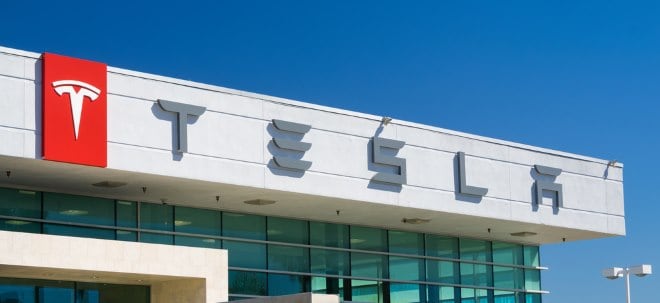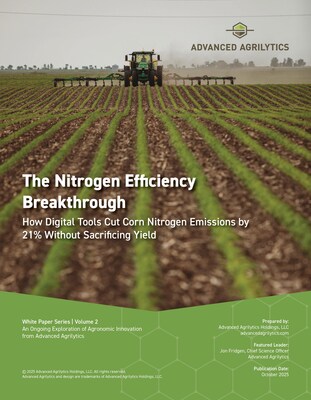Virtual News Conference Reminder: New White Paper: "The Nitrogen Efficiency Breakthrough: How Digital Tools Cut Corn Nitrogen Emissions by 21% Without Sacrificing Yields"
Media Invited to Roundtable Discussion with Company Leaders on Groundbreaking New Findings
INDIANAPOLIS, Oct. 22, 2025 /PRNewswire/ -- Advanced Agrilytics™, a leading agronomy technology company, will host a roundtable discussion of its new white paper, "The Nitrogen Efficiency Breakthrough: How Digital Tools Cut Corn Nitrogen Emissions by 21% Without Sacrificing Yield."
The roundtable is offered exclusively to journalists. It will be held on Monday, October 27 from 2:00 – 3:00 p.m. Central time. Pre-registration is required to participate in the event. Media can pre-register for the event here.
About the White Paper
Unveiled earlier this week at the 2025 Norman E. Borlaug International Dialogue event, the white paper provides detailed findings from a field-based analysis of data from three growing seasons (2022 through 2024) across more than 750,000 acres managed by Advanced Agrilytics. The study confirms that improved nitrogen use efficiency (NUE) can deliver both environmental and economic value, without compromising yields.
The full white paper is available for download here.
Better NUE Provides Economic and Environmental Benefits
Earlier analyses by Advanced Agrilytics had shown that their corn grower customers had a median NUE of 0.75 lb. N/bu, which is significantly better than the industry benchmark of 1.0 – 1.2 lb. N/bu. The objective of this new analysis was to quantify both economic and environmental benefits of the improved NUE across the corn acres that Advanced Agrilytics manages.
The study confirms that these benefits are substantial:
- 23.5% reduction in Carbon Intensity (CI) score: 21.2 g CO2e/MJ vs. Industry baseline of 27.72
- 20.6% reduction in nitrous oxide (N2O) emissions: 10.7 g CO2e/MJ vs. Baseline of 13.47
- Reducing nitrous oxide emissions is especially important because N2O is a potent greenhouse gas, which is 273 times more powerful than carbon dioxide in terms of its warming potential1.
- 272,262 metric tons of avoided CO2e emissions annually
- N2O emissions reduction of 423,641 kilograms (115,654 metric tons of CO2e) annually
These emission reductions are equivalent to2:
- Removing more than 63,000 gasoline-powered vehicles from the road each year
- Offsetting carbon dioxide (CO2) emissions from 26+ million gallons of diesel fuel
- The carbon removed by 4.5 million + tree seedlings, grown for 10 years
The analysis also quantifies the actual economic cost of decreased nitrogen use efficiency. On average across the acres analyzed, a loss of NUE equivalent to 0.15 lb. N /bu can result in a gross revenue loss of $80.42 per acre, due to higher nitrogen input cost and lower yield performance (whether from over application, mis-timed nitrogen application, or nitrogen loss in saturated areas).
When extrapolated across the 750,000-acre dataset used in this analysis, this equates to a total potential annual gross revenue impact of approximately $60 million. In addition, improving NUE can also help growers qualify for incentive payments from both public and private conservation and sustainability programs.
The white paper explains how Advanced Agrilytics' TerraFraming™ platform, which provides sub-acre spatial analysis using patented algorithms, allows for nitrogen and nitrogen stabilizers to be applied with precision, in terms of rate, location, and timing. By proactively managing risk and tailoring nutrient applications to each microenvironment within a field, growers can reduce nitrogen loss while improving crop resilience and yield consistency.
"Our predictive agronomic approach is a smarter, more efficient way to produce crops and improve farming operation sustainability," said Jon Fridgen, Chief Science Officer at Advanced Agrilytics. "Now we have hard data to show the economic and environmental benefits the Advanced Agrilytics' methodology delivers: higher nitrogen use efficiency, lower emissions, and more profit per acre."
The release of this new analysis supports Advanced Agrilytics' broader strategy of positioning predictive agronomy as a cornerstone of sustainable, profitable crop production.
About Advanced Agrilytics
Advanced Agrilytics is a leading agronomy technology company delivering sub-acre agronomic intelligence at scale. Through a flexible ecosystem of data, software, and value-added services, we empower growers, consultants, retailers, and manufacturers to make smarter, more profitable decisions. Our business spans four complementary areas: agronomy services, software licensing, applied research, and sustainability and funding support, including Section 180 residual fertility valuation reports.
Our proprietary spatial agronomy methodology, delivered through products like TerraFraming™, is proven to increase yield consistency, reduce variability, and enhance long-term resilience across every acre.
Founded in 2015 in Huntington, Indiana, and headquartered in Indianapolis, we remain committed to helping partners improve profitability and sustainability while building a legacy for generations to come. Learn more at https://advancedagrilytics.com and follow us on social media.
Sources
1 Intergovernmental Panel on Climate Change (IPCC). The Sixth Assessment Report: The Physical Science Basis, published 2021, reported that nitrous oxide had 273 times the GWP of CO2 over a 100-year period, and that agriculture was the leading source of anthropogenic N2O emissions globally.
2 Equivalency calculations derived by using the U.S. Environmental Protection Agency (USEPA) Greenhouse Gas Equivalencies Calculator. Accessed on July 6, 2025.
![]() View original content to download multimedia:https://www.prnewswire.com/news-releases/virtual-news-conference-reminder-new-white-paper-the-nitrogen-efficiency-breakthrough-how-digital-tools-cut-corn-nitrogen-emissions-by-21-without-sacrificing-yields-302589292.html
View original content to download multimedia:https://www.prnewswire.com/news-releases/virtual-news-conference-reminder-new-white-paper-the-nitrogen-efficiency-breakthrough-how-digital-tools-cut-corn-nitrogen-emissions-by-21-without-sacrificing-yields-302589292.html
SOURCE Advanced Agrilytics



